Newly minted citizens tell their stories
Naturalization. In honor of July 4, we reached out to hear from some of America’s newest citizens.
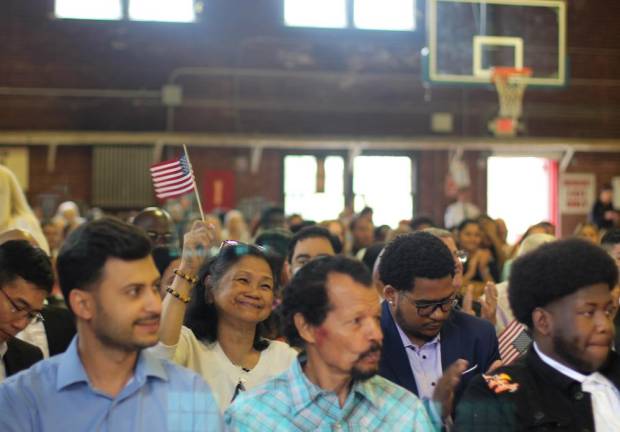
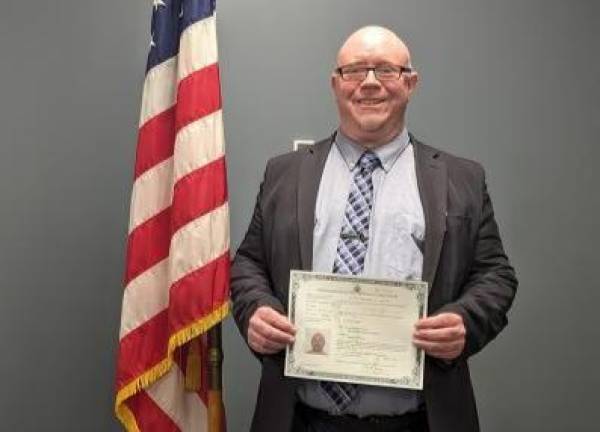
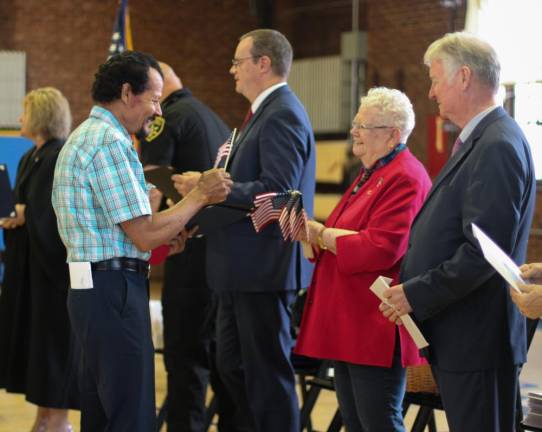
Photo: Brianna Kimmel.
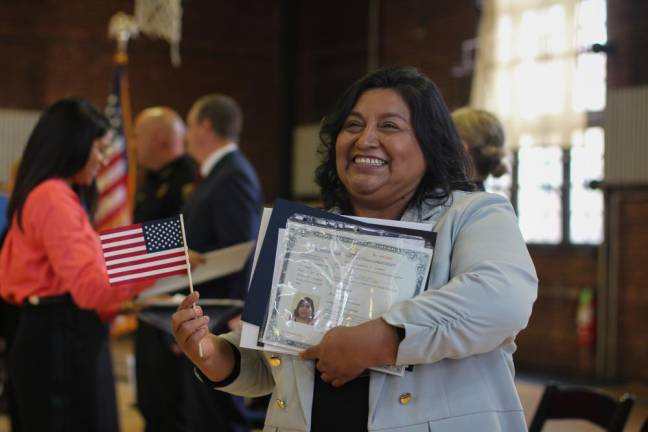
Photo: Brianna Kimmel
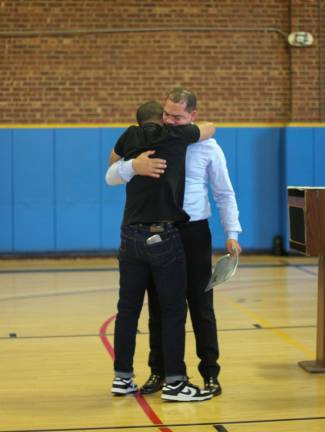
Photo: Brianna Kimmel.
Born elsewhere, these folks have lived in the United States, in some cases, for decades.
To become full-fledged American citizens, each studied for a civics test, sat for an English reading and writing test, paid a ballpark $725 fee and traveled as far as Albany and Philadelphia to take the oath of allegiance at a naturalization ceremony, maybe snap a photo next to a replica Statue of Liberty.
Here are their stories.
‘The USA is a promise’
Damien Hughes, born and raised in Glasgow, Scotland, moved to London when he was 24 to work in theatre. There, he met and married an American man from Baltimore named James Moed. In 2019, they moved with their child halfway across the world to Brooklyn to be closer to Hughes’s mother and father-in-law.
Mid-pandemic, the Hughes family realized the fast-paced New York City lifestyle wasn’t for them, which prompted their move upstate. A 1950s-era home overlooking the Hudson River in Newburgh became theirs, and Hughes wasted no time beginning the naturalization process.
He knew of the constantly changing immigration laws. “I was very aware of changes in immigration status,” Hughes said. “We’re living in strange times.” Hughes described the naturalization process as complicated and convoluted. He felt that an understanding of American bureaucracy was essential just to complete the paperwork and he sympathized with those who had to learn English as a second language to become citizens.
“They can be aggressively bureaucratic and they make you jump through a lot of hoops. It can be very tiring, exhausting,” Hughes said. “But I was still very aware that I came into it at a very privileged position.”
-
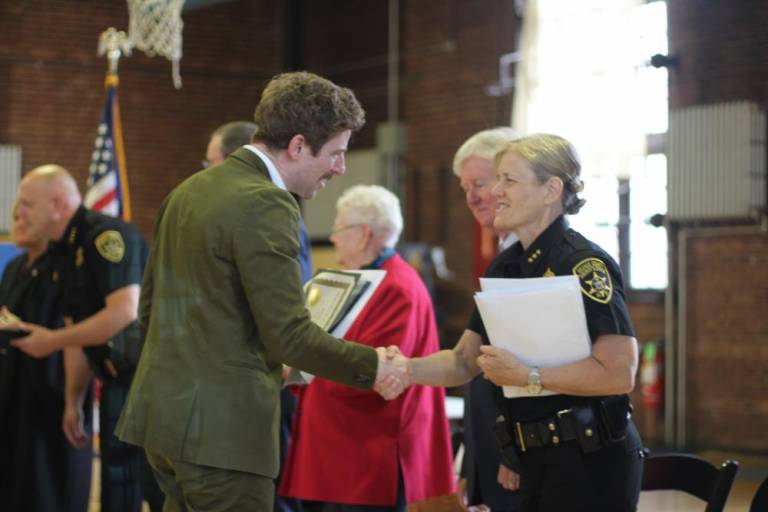 Damien Hughes shakes hands with Undersheriff Evelyn Mallard at a naturalization ceremony in Newburgh. Photos: Brianna Kimmel
Damien Hughes shakes hands with Undersheriff Evelyn Mallard at a naturalization ceremony in Newburgh. Photos: Brianna Kimmel -
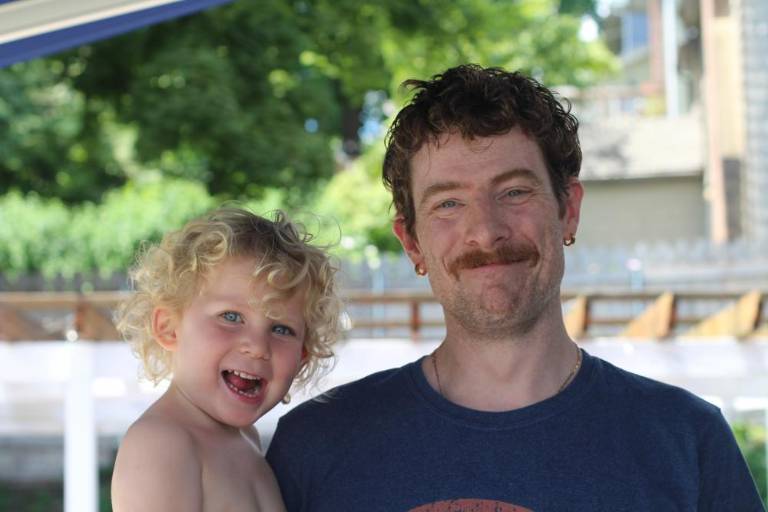 Damien Hughes and his daughter, Minerva Moed Hughes
Damien Hughes and his daughter, Minerva Moed Hughes
The day of his naturalization ceremony in June, Hughes was nervous. He had finished the paperwork and passed the test, but he was terrified that a box was left unchecked or a question unanswered. When he sat down at the front of the room, he took note of the colors and textures of the traditional clothing surrounding him. Surrounded by immigrants, “all a bit fish out of water,” Hughes felt calm.
“It was like a liminal feeling of me just entering something new and I wasn’t quite sure what it meant yet. I was a wee boy back in Glasgow who used to imagine living in America. I had to sit with it for a while.”
American citizenship has given Hughes a new perspective. He registered to vote two days after he became a citizen. It was empowering for him to realize that he now possessed the ability to contribute to the future of the country.
“The USA is a promise. It’s a promise that was vocalized and written down and it is imperfect in many ways. The promise was not kept for a lot of people, but it was still made. And you don’t back out of your promise.”
‘I can say what I want’
Kiyoko Chibana met her husband-to-be in Okinawa, Japan, in 1967. She was 19, the second of six in a poor family; Edward Dowd, 18, was an Irish-American marine on his way to Vietnam, temporarily stationed in Kin, her village. “She claimed me like a lost puppy,” Ed said. “I was stupid and confused, and the woman decided she loved me.”
She was pretty, he added, though at first he thought she was about 15. Two years later they were married.
“I just fall in love,” said Kiyoko. There was “something sad in a way, and forlorn” about Ed, the first American she’d met. “I just noticed this man – my heart, that’s it, something about him,” she laughed. “I got a good one. It lasted this long, it must be good.”
Now retired and living in Dingmans Ferry, Pa., the Dowds are active with their church. Kiyoko prefers in-person conversations to phone, but the week our interview was scheduled, the pair came down with COVID, so she did her best on the phone.
In their early days, the couple developed a sort of pidgin of Japanese and English. “We could actually communicate – not well,” said Ed.
Having spent the ensuing decades bouncing back and forth between Japan and the U.S., Kiyoko’s English has gotten pretty good, while Ed’s Japanese – despite 15 years of trying - remains “very limited,” he said, his accent, nearly unintelligible.
“For years, she’d say maybe I should become a citizen, and I’d say, why?” Ed said. He saw no need because she had a green card and her husband and their three kids were American.
Their set-up was convenient, Kikoyo’s Japanese citizenship allowing them to go back to Japan at will. (Japan, explained Ed, does not look fondly on dual citizenship, and friends of theirs with dual citizenship had their passports confiscated temporarily in Japan.)
But Kikoyo was insistent. “She’d say, well here in America I’m free,” he recalled.
“I grow up really strict,” said Kyoko, drawing a parallel between Japanese strictures and the ways of the Amish. “I grow up in small world in Okinawa. We are so poor. We cannot go nowhere. It’s hard on me – long time.”
Unlike in Japan, which the pair describes as a patriarchal, communal culture where politeness is paramount, in America, Kiyoko enjoyed the latitude to be herself. She could let her hair turn gray, for instance, while in Japan she’d feel pressure to dye it black.
Arriving in America on Valentine’s Day 1978 was like landing on another planet for Kiyoko Dowd, whose kids grew up with opportunities to see the world. “It’s a good life,” she said. “I’m so free, I’m overwhelmed.”
So Kiyoko applied for citizenship, paid the fee, went down to Philadelphia, passed the tests, and waited for a letter. Little did the couple know that, after 9/11, there had been a rule change: green card holders who’d been out of the country for more than a year couldn’t apply for citizenship for five years. A couple years earlier, the pair had lived in Japan taking care of Kiyoko’s mother – so she was rejected, and had to eat the non-refundable application fee.
Kiyoko was undeterred. “She was still going to do it, even though it was very frustrating,” said Ed. “I don’t think most people understand: it’s expensive and it’s not that easy to get your citizenship.”
After the requisite waiting period, she started over. In February 2022, she went down to Philadelphia again, and at 75, became a citizen of the country she had lived in most of her life.
Since then, Kiyoko – now a dual citizen – has voted in every election. “She’s just right of Genghis Khan,” joked Ed, who describes himself as independent, though registered Republican so he can vote in primaries. For local elections, Ed often discusses with Kiyoko who’s on the ballot and what’s going on, “but even if we didn’t talk it over, she would just vote a straight Republican ticket.”
When she goes back to Okinawa now and speaks her mind, “it’s really not polite,” said Kiyoko. But she does it anyway – shocking everyone, particularly the women in her family. “Everyone afraid of me, to tell the truth,” she laughed.
“I have a freedom to speak. I can say what I want,” she said. “It’s a miracle.”
‘I always get stopped at immigration’
Karla Mondloch immigrated to the U.S. from Costa Rica in 2000 when her grandmother died. After 9/11, laws changed and Mondloch and her family couldn’t go back to Costa Rica.
“We were stuck here,” said Mondloch, who has spent most of her life in the U.S.
Mondloch recalled a childhood that was in some ways stuck in limbo, especially when it came to educational opportunities. Her immigration status meant she had to turn down an offer to play Division 1 basketball because the school couldn’t give her an athletic scholarship because she wasn’t a citizen. She ended up playing basketball at a Division 3 school where she got an academic scholarship.
Unable to get a driver’s license, she had to change her major to one that was more easily accessible by public transportation.
“I always get stopped at immigration,” added Mondloch. As a new American citizen, she is looking forward to “traveling at ease.”
‘Glad to join the club’
“I feel very excited, very proud,” said brand new citizen Gordon Elliott at a naturalization ceremony on June 12 at the Newburgh Armory United Center in Orange County, N.Y. “I’m glad to join the club,” he said, gesturing toward his wife and children, who are birthright citizens.
Thirty-one countries were represented at the June naturalization ceremony where 88 Orange County residents, including Elliott, became U.S. citizens. The Dominican Republic was most strongly represented with 12 naturalizations; Honduras followed with nine, and Mexico had seven.
Orange County Clerk Kelly Eskew hosts naturalization ceremonies so residents can take the oath of allegiance without having to travel to a federal courthouse far away in Albany, Syracuse or New York City.
Elliott moved across the pond from the United Kingdom in 2007. He applied for citizenship in January of this year, when his green card expired. He had his interview in March, and three months later, became a citizen. “It was actually very easy,” he said.
‘It seemed like the right time’
Originally from the U.K., Chris Thurtle met his wife-to-be online while he was in college. After “spending a lot on phone bills and flying back and forth to see each other,” he came over on a K-1 visa, which permits a foreign-citizen fiancé to come to the U.S. to get married and eventually apply for a green card.
Three kids and nearly two decades later, “I decided to go ahead and do it. It seemed like the right time,” said Thurtle, 48, who started the naturalization process in December 2023. “There was a jump in price coming up as well.”
Thurtle, of Goshen, N.Y., is digital marketing manager for Garnet Health and an adjunct psychology professor at Orange County Community College. In February, he went to Albany for an interview with an immigration officer, including a reading and writing test and an oral civics test.
His wife helped him study for the civics test, whose answers are available to would-be citizens ahead of time. He knew about 85 of the 100 potential questions off the top of his head; the other 15, the pair went over a couple times until he had them memorized.
Summoned back to Albany in March, he and his wife drove up for the second time, spending the night at a hotel to be at an 8 a.m. naturalization ceremony. (It’s luck of the draw whether Orange County residents get to have their ceremony in-county.) The whole thing happened faster than he’d expected.
Now Thurtle is a dual citizen, like his kids, who have U.K. citizenship through their father.
Thurtle knows he’s fortunate in that fitting in here was never something he had to think about – aside from focusing on his pronunciation of words like “battery” and “inventory.”
The most surprising thing upon arrival here was, in fact, “how similar it was to England, other than I found that I had to drive a whole lot more,” he said.
And Brits, true to stereotype, are more reserved.
“I’m certainly aware of how lucky I am that I’m from a European country, where people don’t assume by my skin color what my immigration status is,” he said. “People don’t look twice as me, unless they hear me talking for too long.”
Still, his lack of full citizenship was always in the back of his mind, especially during times when animosity toward immigrants was in the news. Plus, he wanted to be a full participant in our democracy, like everyone else.
“I’m sure some people find it onerous to do jury duty and vote, but I think those are important parts of participating in society,” he said. He may have been the most enthusiastic resident at a recent school budget vote in Goshen. “That was fun for me being able to vote for the first time. That was really the piece that was, to me, missing the most.”
‘It’s like a rollercoaster ride’
High school sweethearts Chris and Samantha Allen started dating when they were 17 in the U.K.
When Chris’ boss asked if he wanted to take on an assignment in the U.S. in 2016, “We were like, wow, that would be a great adventure,” said Chris. “Why not? It’s like a rollercoaster ride, let’s see where it takes us.”
Chris received an L1-A working visa that allowed the entire Allen family to move to the U.S. for three years. Chris, Samantha, their two children, 12 and 9 at the time and their dog (who needed a passport, too) moved to Galveston, Texas in 2016.
After two years in Texas, the family moved to the Hudson Valley. Chris and Samantha applied for U.S. citizenship when their visas expired.
Although they were nervous about the test, the pair said the process was “seamless” and fast.
Chris’ naturalization was in April of 2021 in Albany. Samantha took her test in Albany, but was naturalized at the Newburgh ceremony in June of this year.
Adjusting to life in the states wasn’t hard. “We just felt like we kind of fit,” Chris said. “It feels like home. We fell into something that we really liked, and it liked us back.”
From the beginning of their relationship, the Allens craved adventure. When an opportunity arose that would move them across the world, the couple jumped at it.
“Life’s for living and you don’t know what tomorrow’s going to bring. Make the most of the chance that you get,” Samantha said.








